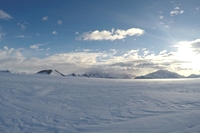In the same section
-
Share this page
Research project CHASE (BRAIN-be program)
Through several sampling campaigns, CHASE project will evaluate the presence of anthropogenic pollutants in Antarctica.

Through several sampling campaigns organized in Antarctica (close to the Princess Elisabeth Antarctica station), this project will provide a unique detailed physical-chemical database of both atmospheric and surface snow particles as well as of VOCs and thoroughly investigate their atmospheric transport pathways in Dronning Maud Land, East Antarctica. This research will help to interpret climatic data extracted from ice cores and the deposition of mineral nutrients, but also to better identify organic micro-pollutants in polar regions and their potential interactions with human activities.
Coordinated by the Royal Meteorological Institute of Belgium, the project associates the ULB - Laboratoire G-Time, N. Mattielli-, the VUB and the Ghent University.
End of the project: 15/04/2021
